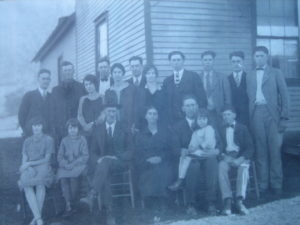 Every year, my extended family has a reunion attended by upwards of 70 of my closest cousins. (My grandfather came from a family of 13 kids.) It takes place deep in the heart of Appalachia, where 3 states converge. The land there is a constant undulation of hills and hollows that spread in every direction. The roads split and converge as they roll over the hills, leaving you completely lost. Most of the people who live here have done so since the Revolution.
Every year, my extended family has a reunion attended by upwards of 70 of my closest cousins. (My grandfather came from a family of 13 kids.) It takes place deep in the heart of Appalachia, where 3 states converge. The land there is a constant undulation of hills and hollows that spread in every direction. The roads split and converge as they roll over the hills, leaving you completely lost. Most of the people who live here have done so since the Revolution.
One thing that doesn’t exist here is broadband. With houses spread out across farmland and mountains cutting each tiny hamlet off from the next, the inability to derive any profit from broadband connections has kept the larger ISPs away from the area. Yet, the need is here is profound. Contrary to popular belief, rural people want access to the wider world through technology. They know that without it, they will fall more economically behind than they already are.
Often, larger companies will go into rural areas, charging high prices, and will expect the same response they receive from city or suburb dwellers – instant adoption. For some, that might happen, but for many, the prices are just too high for them to perceive any benefits from broadband. Additionally, the services large ISPs provide just aren’t right to meet the needs of rural people or their businesses. Here are a few examples:
- Bringing broadband lines to the edge of the property, instead of directly to the farm buildings, which are a mile or more inside a 2000 acre farm.
- Building cell towers on sacred sites within a reservation, because they did not bother checking with the tribe before starting the work.
- Charging entirely too much for internet business services for stores that are so small, they may sell shoes, and hairspray, as well as sharpen saw blades.
When a municipality, especially one that is administered by the very people who need broadband service, decides to provide that service, they go into the process understanding local needs. They have a grasp on what the local economy is like and can, in many ways, better anticipate both the mechanical and social problems that may come from such a big change to the community.
Municipal Broadband doesn’t mean that the government owns and runs the system, however. Many towns have created a private entity or a public-private partnership that owns and runs the utility. In Eureka, Montana, the local ISP provides free wireless broadband to the downtown area and both phone and internet service, for a reasonable fee, to the rest of the region. It’s a solvent private company that, because it is based locally, provides better service than the big companies can.
Powell, Wyoming created a public-private partnership, where they obtained numerous agreements with public entities, such as hospitals, libraries and schools, and private companies, such as John Deere, to establish a customer base before work even started. They turned those agreements into both publicly issued bonds and private equity investments to support the ISP infrastructure. (The John Deere dealership even moved into town in order to be closer to the ISP.) A better description of the project and determination of its effects can be found in an assessment provided by the Powell Tribune. One thing they noted is that if this project hadn’t happened, there would still be no broadband in the region.
That’s really the crux of the matter. Unless local municipalities and businesses start their own initiatives, broadband will never reach rural America. This means higher costs for our raw materials: foods, timber, minerals, and water. They all come from the countryside. In rural America, it’s worth it to support locally-owned, municipal internet services. Now, we just need the states to stop blocking municipal broadband.


